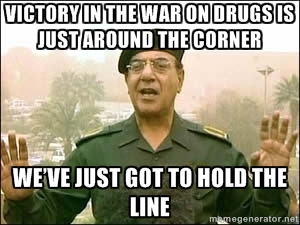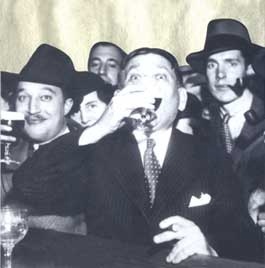In Forbes, Jacob Sullum admits that the sudden change of heart by the New York Times made him stop and reconsider whether he’d been wrong all this time:
According to a recent poll by the Pew Research Center, 54 percent of American adults support marijuana legalization. That’s around 130 million people. It turns out that some of them are members of the New York Times editorial board, which on Sunday declared that “the federal government should repeal the ban on marijuana.”
Given its timing, the paper’s endorsement of legalization is more an indicator of public opinion than a brave stand aimed at changing it. Andrew Rosenthal, editorial page editor at the Times, told MSNBC’s Chris Hayes that the new position was not controversial among the paper’s 18 editorial writers and that when he raised the subject with the publisher, Arthur Sulzberger, “He said, ‘Fine.’ I think he’d probably been there before I was. I think I was there before we did it.” Better late than never, I guess, although I confess that seeing a New York Times editorial in favor of legalizing marijuana briefly made me wonder if I’ve been wrong about the issue all these years.
In their gratitude for the belated support of a venerable journalistic institution, antiprohibitionists should not overlook the extent to which the Times has aided and abetted the war on marijuana over the years. That shameful history provides a window on the origins of this bizarre crusade and a lesson in the hazards of failing to question authority.
[…]
In short, the Times first publicly toyed with the idea of marijuana legalization in 1972, but it did not get around to endorsing that policy until 42 years later. What happened in between? Jimmy Carter, a president who advocated decriminalization, was replaced in 1981 by Ronald Reagan, a president who ramped up the war on drugs despite his lip service to limited government. That crusade was supported by parents who were alarmed by record rates of adolescent pot smoking in the late 1970s. Gallup’s numbers indicate that support for legalizing marijuana, after rising from 12 percent in 1969 to 28 percent in 1978, dipped during the Reagan administration, hitting a low of 23 percent in 1985 before beginning a gradual ascent.
Legalization did get at least a couple of positive mentions on the New York Times editorial page during the 1980s. A 1982 essay actually advocated “regulation and taxation” as “a more sensible alternative” to decriminalization, arguing that “a prohibition so unenforceable and so widely flouted must give way to reality.” But that piece was attributed only to editorial writer Peter Passell, so it did not represent the paper’s official position. Four years later, an editorial that was mainly about drug testing asked, “Why not sharpen priorities by legalizing or at least decriminalizing marijuana?” Good question. Let’s think about it for a few decades.





